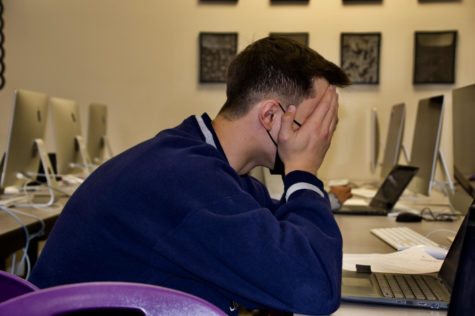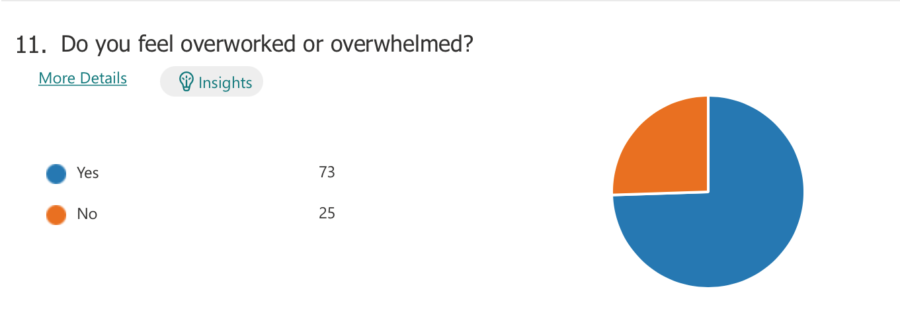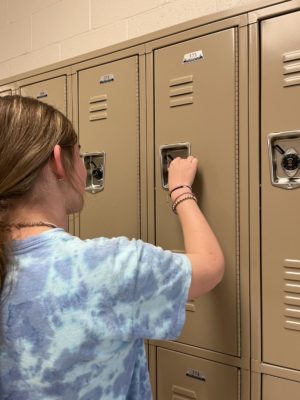How to Have it All While Maintaining Good Mental Health: Student Edition
A recent poll taken shows that 80% of the surveyed students at Rocky Mountain High School feel “overworked or overwhelmed.”
October 7, 2021
America lives at a fast pace. No matter what happens, the world keeps on spinning. Lives keep on going. Teenagers will find themselves drowning in work, all while trying to keep a decent social life. A recent poll taken shows that 80% of the surveyed students at Rocky Mountain High School feel “overworked or overwhelmed.”
When asked to rate how stressed they are from 1 (being not bad at all) to 5 (Super Stressed), 75% of the surveyed students rated their stress levels at a 5. Many admitted to having “severe anxiety or depression,” making it already difficult to handle stress as it is without adding a heavy workload. But why? What brings these students down? Why do they overwork themselves? Callie Phillips, an RMHS student, shares stories from her life, including her busy schedule as well as how it’s taken a toll, not only on her mental health, but her physical health as well.
Callie Phillips is a senior here at Rocky Mountain High School. She lived in China for the first 13 years of her life, and then moved to Idaho the beginning of eighth grade. When living in China, she lived a “rigorous” school life, where “all the efforts were focused on studies, and grades.”
Her schedule didn’t get any less crammed when she moved to America, even though it wasn’t entirely about school. This year alone, Phillips has a heavy schedule. From working 14 hours a week, to spending over 13 hours practicing and playing rugby during the school week, it seems like she “doesn’t have any time for anything else.”
Phillips made the decision to finish high school with her associate’s degree, and this is her last year, so every single one of her classes are concurrent/dual enrolled college classes. She has at least two hours of homework each night, if she’s not able to finish the work during school hours.
Where do students find the time to do everything? Can they find that time? According to “Teens Health,” teenagers, especially ones who play sports and attend school, should be getting “8-10 hours of sleep each night.” Lack of sleep can make it difficult to complete things at 100% ability, which causes more stress, and more panic, and more anxiety.
Phillips shared how her stresses caused some more serious problems: “I have a whole medical thing with my lungs and stuff. I start to freak out, I can’t breathe which can sometimes cause me to get claustrophobic. One of my biggest triggers is from the daily stress and anxiety I get from a busy schedule.”
Phillips has a lot on her plate, from hours of prestigious work, physical labor for rugby, as well as the hours put for work. She’s made it a priority to continue hanging out with friends and to still be a teenager.

It is hard finding time to relax and take a break from the world. Most students said they “could not find many times where [they] could just breathe.”
It is always one thing after another. A counselor here at Rocky Mountain, Mrs. Heather Ginn, has seen kids struggle repeatedly with the constant stresses of life. When asked how to deal with these problems, she suggested students do the following:
“I think the biggest thing is to recognize your own personal boundaries; if you’re, if you’re feeling stressed or overwhelmed, take a look at what’s going on in your life.”
“Next to that, communicate! Communicate with your family communicate with a safer, a trusted adult that you have to help you make that decision, what in your life can be maybe taken back a level or help to balance things out. Or is there extra help that might be needed outside of that, so you have to make sure that you’re paying attention to those boundaries and those signs that your body is giving you. We often like to put them aside, but that doesn’t always work, they creep up later.”
“Identify when you are doing too much; you need to make sure that you take that step back and revaluate how you balance, and the most important thing is to have that time for yourself.”
Visit the Counseling Office’s web resources page here
Sometimes students tend to forget to squeeze in personal time to evaluate what they need to do for themselves. But by following these steps, and using a strong support system, students can overcome the stresses of school.
Students also asked teachers to do a few things for them as well. A respondent to the survey said, “I think teachers should be more understanding about homework and assignments and presenting in class and I also think school in general just needs to be a more comfortable environment.”
School is not the only thing going on at once, and even if it was, there is still a lot of stress coming from school. Some students suggested finding a unique way of grading, to really see if students learn. Others suggested therapy, and that everyone should have a therapist. But most importantly, figure out what matters. Prioritize good things that will get you somewhere in life, as well as your mental health. It is important to take mental breaks and breaks in general. It is okay to be busy, but also take into consideration that everyone needs to come up for air at some point.






